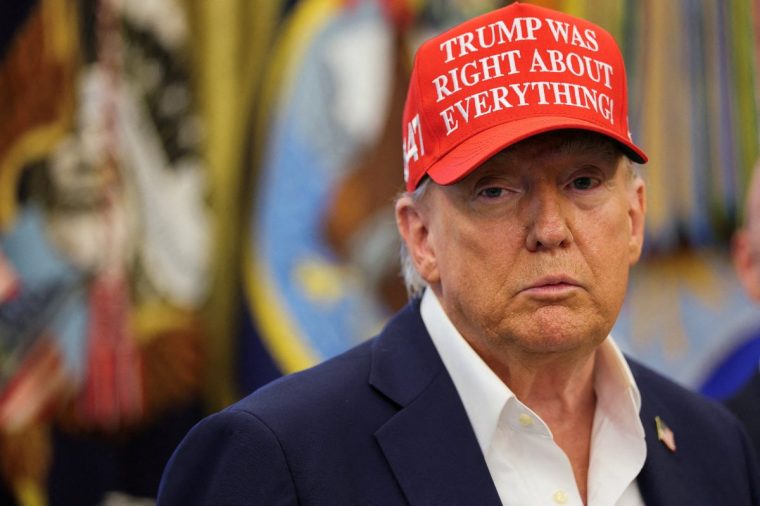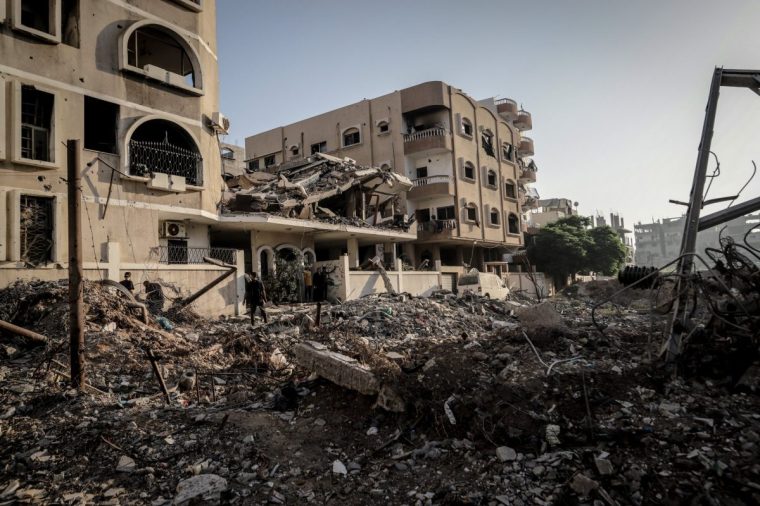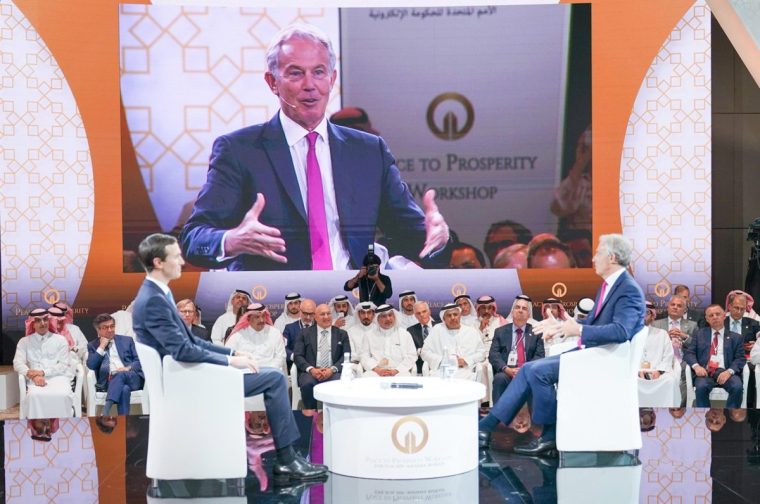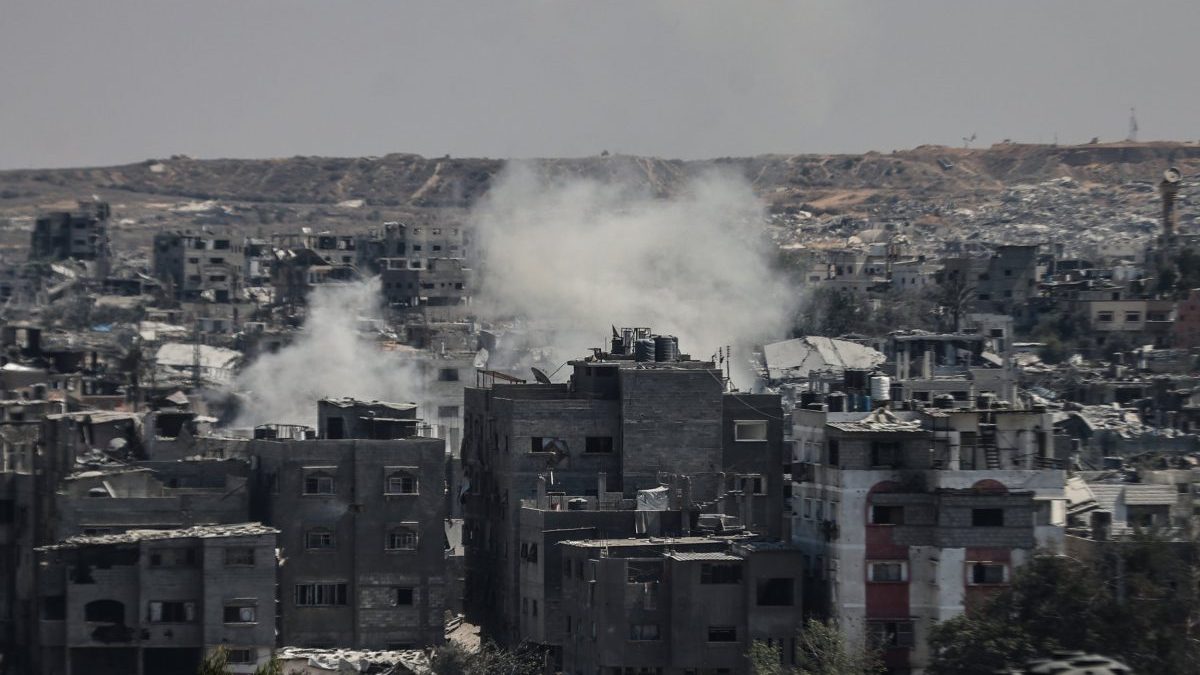‘GREAT Trust’ plan was reportedly developed by the same Israelis who set up the controversial Gaza Humanitarian Foundation
Details of a postwar plan for Gaza, reportedly being considered by the Trump administration, propose transferring the enclave into a trusteeship administered by the US for at least a decade.
Designed to align with the US President’s promise to “take over” the Strip, it is believed to involve “AI-powered, smart cities” and digital tokens for relocated Palestinians.
The 38-page prospectus, seen by the Washington Post, outlines the relocation of Gaza’s more than 2 million people, at least on a temporary basis, either through “voluntary” departures to another country or into restricted, secured zones within Gaza while it undergoes reconstruction.
A tech hub
The proposal is believed to suggest Gaza would be transformed into a tourism resort and high-tech manufacturing and technology hub.
Named the Gaza Reconstitution, Economic Acceleration and Transformation Trust, or GREAT Trust, it was developed by some of the same Israelis who set up the Gaza Humanitarian Foundation (GHF).
Around 1,000 Palestinians have been killed in the vicinity of a GHF aid distribution site since its programme was set up in May, according to UN data.
Under the GREAT Trust, Gazans who own land would be offered a digital token by the trust in exchange for rights to redevelop their property, according to the report.
 Earlier this week, Donald Trump held a high-level meeting to discuss the future of Gaza (Photo: Johnathan Ernst/Reuters)
Earlier this week, Donald Trump held a high-level meeting to discuss the future of Gaza (Photo: Johnathan Ernst/Reuters)
The token could then be used to help finance a new life in another country or be eventually redeemed for a flat in one of six to eight new “AI-powered, smart cities” to be built in Gaza.
$5,000 in cash
In order to fund a life in a new country, Gazans would allegedly be given $5,000 in cash (£3,695.50) under the “voluntary” departure scheme, along with subsidies to cover four years of rent elsewhere and a year of food.
The plan also calculates the amount of money that would be saved per person who leaves their home territory, compared to if they were housed in temporary accommodation inside Gaza.
Around $23,000 (£17,000) would be saved per Gazan who signs up to the relocation plan, the plan is said to estimate.
Meanwhile, this weekend in Gaza Israeli forces pounded homes in Gaza City from the air and ground as they continue with plans to take over the whole of the enclave.
At least 30 people were killed on Sunday, Hamas-run health authorities said, including 13 who tried to get food from near an aid site in the central Gaza Strip.
 A building turned to rubble in the Al-Karama neighborhood of Gaza City (Photo by Saeed M. M. T. Jaras/Anadolu via Getty)
A building turned to rubble in the Al-Karama neighborhood of Gaza City (Photo by Saeed M. M. T. Jaras/Anadolu via Getty)
The authorities added that at least 15 people, including five children, were killed in an attack on a residential building in the heart of Gaza City on Saturday.
The Israeli military spokesperson’s office said they were reviewing the reports.
In one airstrike, Israel said it killed Abu Obeida, the spokesman for Hamas’s armed wing and one of the few remaining senior members of the group’s military wing from before its brutal attack in 2023.
Earlier this week, Donald Trump held a high-level meeting to discuss the future of Gaza, how to end the war and ideas of what may come next.
Tony Blair attended Wednesday’s meeting, along with Trump’s son-in-law Jared Kushner – who is said to enjoy close relations with the former prime minister.
Kushner previously floated the idea that Gaza be cleared of its Palestinian inhabitants and turned into a waterfront property.
In February, Trump proposed a US takeover of Gaza and a permanent displacement of Palestinians from the coastal territory. The plan was globally condemned and labelled as an “ethnic cleansing” proposal by rights experts and the UN.
 Blair and Kushner in Bahrain in 2019 (Photo: BNA/Anadolu via Getty)
Blair and Kushner in Bahrain in 2019 (Photo: BNA/Anadolu via Getty)
Trump billed the plan as a redevelopment idea to turn Gaza into the “Riviera of the Middle East”.
View from the Middle East
It is not known to what extent, if at all, GREAT Trust was discussed during Wednesday’s meeting. However, significant elements of it were reportedly designed to align with the president’s “Riviera” vision.
Leaders in the Middle East are bound to fiercely reject any plan that would see the removal of Gazans, voluntary or not.
Any forcible displacement is illegal under international law.
A big selling point of the GREAT Trust proposal is that it claims not to need government money, while promising healthy returns for investors.
Unlike the often financially stretched GHF – which relies on armed American contractors to deliver aid in parts of southern Gaza – the trust would not depend on charitable donations.
Instead, its financing would come from large-scale public and private investments in so-called “mega-projects,” including electric vehicle factories, data centres, coastal resorts and high-rise housing.
According to its projections, a $100bn stake could generate close to a fourfold return within a decade, underpinned by what it describes as “self-generating” revenue streams.
“I believe [Trump] is going to have a bold decision” when the fighting ends, one person familiar with internal administration deliberations told the Washington Post. “There are multiple different variations where the US government could go, depending … on what happens.”
When asked to comment on the GREAT Trust, the White House referred questions to the State Department, which declined to comment.
